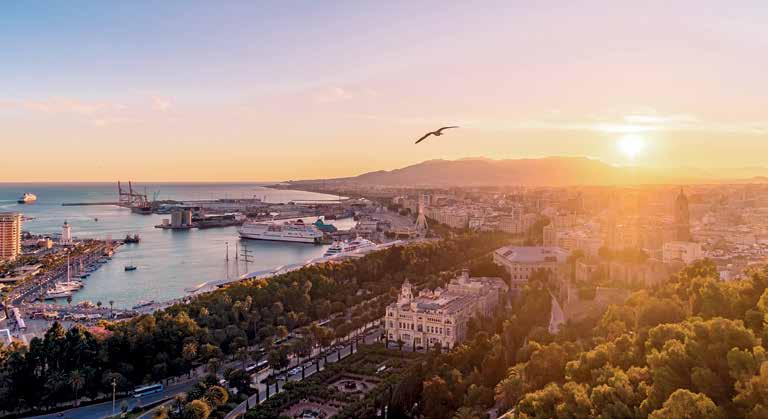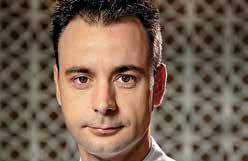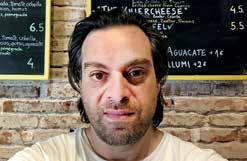
7 minute read
EYE ON
SPAIN IN THE SPOTLIGHT
Spain has always been known as an exciting culinary destination. However, Covid-19 has put a huge strain on many of the country's restaurants. Against this backdrop, we asked five professionals to share their experiences of operating in a crisis.


Eduard Xatruch Cerro
Chef and co-owner, Compartir and Disfrutar restaurants COVID-19 has brought the hospitality industry to a standstill. How is Spain’s restaurant sector reinventing itself? Nowadays, the demand is from locals, but they are not consuming as much as before and are dealing with their own problems. How did you decide to tackle the challenges stemming from the crisis? We thought a lot about it and decided to focus on our core values, those that have brought us here. Although we can accommodate fewer customers, the response has been positive. We can continue working with a full team, which was something that concerned us during the lockdown. What culinary trends have been forecast? I think that sustainability will be a real trend. It was a trend before the coronavirus, but now it is stronger than ever. How do you expect the hospitality sector to move forward? Everybody is trying to do his or her best. For example, take-away is something that became more popular during the lockdown, and I think this trend will continue for a long time. Unfortunately, many restaurants will not be able to open again. Those that are able to resume business will need to work on their adaptability and creativity. Do you have any projects in the pipeline? Our main projects right now are Compartir and Disfrutar. We are working hard because we want both our restaurants to be better than ever. At the same time, we will offer a snack box and a cocktail box for delivery at Disfrutar. It is something new that we started working on at the end of August. We are also putting our efforts into a book about Disfrutar. We hope to publish it at the end of this year. In parallel, we are also continuing our consultancy services for other brands.
Paul Haddad
Chef and owner, Beirut-Barcelona restaurant COVID-19 has brought the hospitality industry to a standstill. How is Spain’s restaurant sector reinventing itself? The pandemic forced the closure of the entire sector for three months. The reopening in Spain is proving to be very complicated because the idea of going to a restaurant is to share, but COVID-19 is forcing people to stay away. Also, restaurants can only operate at 50 percent capacity. Delivery is becoming very important, which the local market was not strong at previously. Menus are being replaced by QR codes. How do you expect the hospitality sector to move forward? I think we will move towards healthier, traditional food.
What is encouraging people to travel to Spain despite the pandemic? Spain will always be a country that welcomes tourists, many of whom come for the weather and gorgeous beaches. How is the restaurant industry recovering? Recovery is slow, and entrepreneurs are waiting to take decisions.

Teddy Kamel
Owner, Teddy's Barcelona COVID-19 has brought the hospitality industry to a standstill. How is Spain’s restaurant sector reinventing itself? The hospitality sector in Barcelona is one of Spain’s most badly affected. More than 20 percent of the restaurants have closed permanently. The rest are trying to fight back in different ways: reducing the number of employees, creating smaller menus, adjusting opening hours, and offering homedelivery services. Restaurants with terraces are definitely optimizing this valuable space. How did you decide to tackle the challenges stemming from the crisis? We actually stayed open during the confinement due to the fact that our core business is home delivery. It did not go well, however. Unfortunately, we had to make staff cuts, but we took the decision not to close.
What culinary trends have been forecast? Fast and cheap food is trending, and junk food is in demand more than ever.
How do you expect the hospitality sector to move forward? As lots of restaurants have closed and people are sticking to brands they know, the hospitality sector will be soon be ruled by fast food chains. They are the ones who still have capital to invest in new outlets. What is encouraging people to travel to Spain despite the pandemic? Spain will always be a prime tourist destination due to its sunny weather, its infinite beaches and the fact that it is one the cheapest countries to visit in the Mediterranean. Even though we keep coming in and out of confinement due to the never-ending pandemic, tourists keep coming back. Do you have any projects in the pipeline? All projects are on hold for the moment. This year was going to be a year of expansion, but we have our hopes pinned on 2021. Our main focus is franchising Teddy’s Barcelona, and we plan to target northern Europe as they are in desperate need of new, healthy, fresh fast-food concepts that incorporate products from the Mediterranean. We will also try to franchise to the Arab countries, mainly the Gulf region where our concept and cuisine is already known.

Alex Mteiny
Co-founder and GM, Makan Saj COVID-19 has brought the hospitality industry to a standstill. How is Spain’s restaurant sector reinventing itself? I think traditional Spanish restaurants are still figuring it out. As for the rest, working with delivery services is crucial. How did you decide to tackle the challenges stemming from the crisis? Actually, this confinement extended our reach to new clients who hadn’t yet tried our family recipes. We were one of the few open in the neighborhood, so we attracted many new customers. What culinary trends have been forecast? Globally, gluten-free is taking off. I also see more vegetarians at Makan. People are shying away from large food corporations and homemade is gaining momentum. In Spain, this shift is slower. Although they love to eat different local cuisines, you can’t take their ham or meat away! How do you expect the hospitality sector to move forward? Literally everything is online. The hospitality sector will have to adopt a hybrid business model. I am a firm believer that humans are social creatures, and this will not change. But the tech age is afoot, and the hospitality industry needs to catch up. Do you have any projects in the pipeline? Makan is a family-born Lebanese eatery. We want to share our recipes and our story with Madrid, Spain, Europe and beyond. We’re looking at opening some other branches around Madrid. We want to grow in the right way.

Kiko Moya Redrado
Chef, Restaurante L'Escaleta COVID-19 has brought the hospitality industry to a standstill. How is Spain’s restaurant sector reinventing itself? After suffering two difficult crises and things beginning to pick up, came COVID-19. The response in each case has been different; many urban restaurants have shifted to takeaway food, but we could not do much because it required major kitchen reform. There are still many restaurants that have not opened and opted for more casual formats. How did you decide to tackle the challenges stemming from the crisis? In our particular case, we took the opportunity to complete major restructuring in the kitchen, to resume our activity with greater force. I think it was the right response, as we have opened with confidence to serve our guests. What culinary trends have been forecast? In my opinion, essentialism in dishes and preparations, marked by sustainability. How do you expect the hospitality sector to move forward? I think that the high-end restaurant sector, where I have more experience, has adapted perfectly to the new regulations, particularly the idea of social distancing. For this reason, far from having bad figures, we are working well. Those who are suffering are largely the restaurants that depend on tourists from overseas. How is the restaurant industry recovering? I think that in a very unequal way, in the urban areas of Madrid and Barcelona. Summers used to be bad, but now there is also the absence of foreign tourists and the flow generated by companies. However, restaurants like ours, far from these nuclei, are working at a good pace, at least this summer. We need to see what happens when we approach winter. Do you have any projects in the pipeline? Yes, we always do. This year the restaurant turns 40, so it is a special year. We are marking the occasion by inviting 40 of the best chefs in Spain to cook at 10 dinners that we’ve organized throughout the year.










